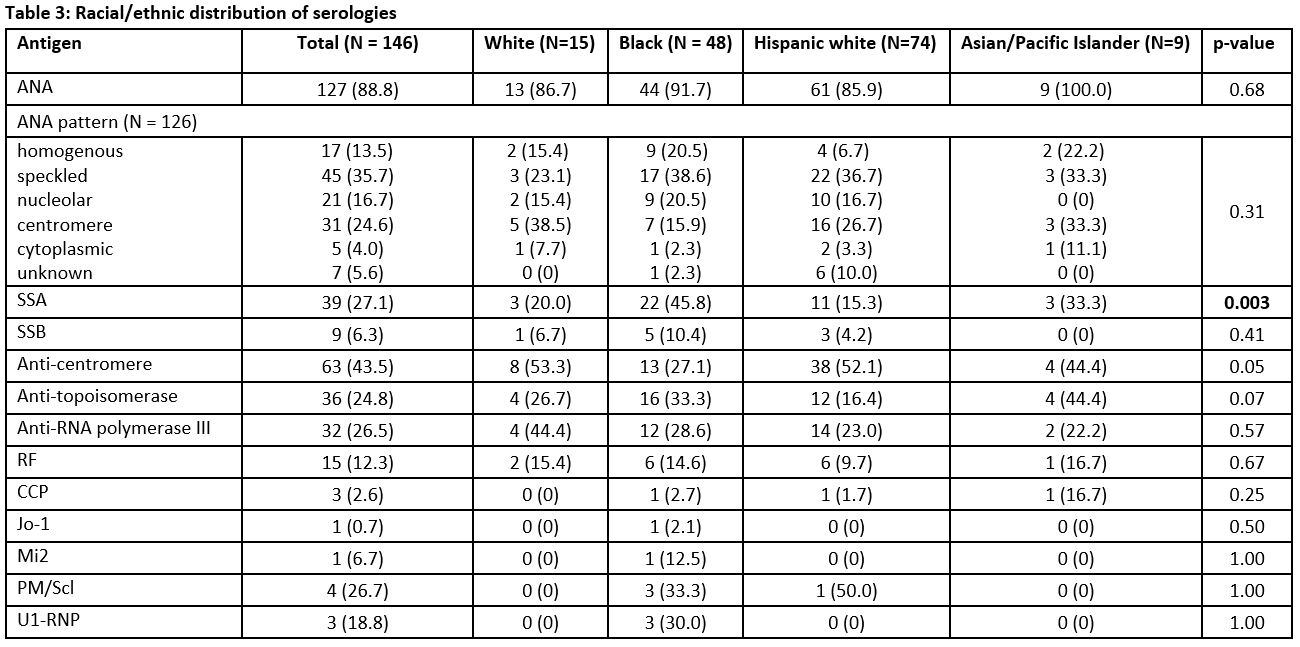Session Information
Session Type: Poster Session C
Session Time: 10:30AM-12:30PM
Background/Purpose: Systemic sclerosis (SSc) is a chronic, systemic autoimmune disease with a higher prevalence among women and racial/ethnic minority groups in the US. Despite the growing number of Asian/Pacific Islander and Hispanic individuals in the US, there is limited literature about the epidemiology of SSc in these populations. This single-center retrospective cohort study aims to compare the clinical features of SSc in a racially and ethnically diverse patient population.
Methods: After the institutional board review approval (IRB), electronic medical records were queried to identify patients who met the 2013 ACR classification criteria for SSc. A retrospective chart review was done to identify the demographic, clinical parameters and the disease course. Median (IQR) for the continuous variables, n (%) for the categorical variables were generated. Kruskal Wallis tests were used to compare the continuous variables, Chi-square tests or Fisher’s exact tests were used to compare the categorical variables. All tests were two-sided, p-value < 0.05 was considered statistically significant. SAS software version 9.4 (Cary, NC, USA) was used for the statistical analyses.
Results: A total of 146 patients with SSc met the inclusion criteria. Baseline characteristics were evenly distributed among race and ethnicity. While degree of skin involvement was evenly distributed as well, black patients had significantly higher rates of overlap syndromes than Hispanic patients (p = 0.01). Organ involvement was also affected by racial/ethnic background: puffy fingers and calcinosis cutis were more frequently reported in non-Hispanic White and Asian patients (Table 1, p = 0.01 and 0.003 respectively). Perifollicular hypopigmentation was reported far more frequently in Black patients than non-Hispanic White patients (Table 1, p < 0.0001). Telangiectasias were more commonly reported in Hispanic than Asian patients (Table 1, p = 0.005). GERD was less frequently reported in non-Hispanic White patients than Asian patients (Table 2, p = 0.04). Gastritis was more frequently reported in non-Hispanic White than Black patients. Analysis of serologies revealed anti-SSA more frequently and reported in Black than Hispanic patients (Table 3, p = 0.003).
Conclusion: This is one of a few studies describing racially diverse cohorts with systemic sclerosis. Our findings illustrate differences in manifestations of SSc amongst minority groups, emphasizing a need for larger studies to better understand these differences. Tailoring treatment to better address race and ethnicity-specific features of disease in one of many ways to address structural disparities in healthcare. This study highlights the utility of a national registry of SSc patients’ ethnicity, organ manifestations, serologies, and management.
To cite this abstract in AMA style:
Hurley H, Chen D, Xie X, Parmar M, Ayesha B. Racial and Ethnic Differences in the Prevalence of Disease Features in Systemic Sclerosis [abstract]. Arthritis Rheumatol. 2024; 76 (suppl 9). https://acrabstracts.org/abstract/racial-and-ethnic-differences-in-the-prevalence-of-disease-features-in-systemic-sclerosis/. Accessed .« Back to ACR Convergence 2024
ACR Meeting Abstracts - https://acrabstracts.org/abstract/racial-and-ethnic-differences-in-the-prevalence-of-disease-features-in-systemic-sclerosis/



